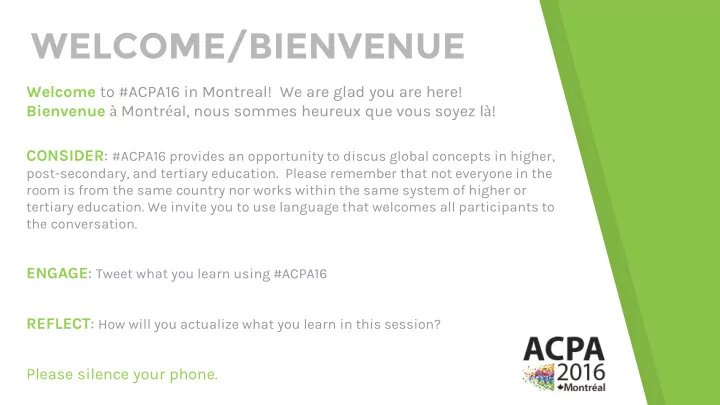

WELCOME/BIENVENUE Welcome to #ACPA16 in Montreal! We are glad you are here! Bienvenue à Montr é al, nous sommes heureux que vous soyez l à ! CONSIDER : #ACPA16 provides an opportunity to discus global concepts in higher, post-secondary, and tertiary education. Please remember that not everyone in the room is from the same country nor works within the same system of higher or tertiary education. We invite you to use language that welcomes all participants to the conversation. ENGAGE : Tweet what you learn using #ACPA16 REFLECT : How will you actualize what you learn in this session? Please silence your phone.
MEASURING STUDENT LEARNING WITH A PRE/POST TEST DESIGN Laura Walaszek Dermody, PhD she/her/hers @LauraWalaszek
LEARNING OBJECTIVES 1. Identify best practices for designing measurable learning outcomes. 2. Compare direct and indirect methods of assessment and evaluate the differences. 3. Generate a list of compelling reasons why pre/post test designs may be an appropriate format for higher education assessment practices 4. Identify effective pre/post test designs and a strong framework for implementing pre/post test design at participant’s home institution.
AGENDA ▸ Introduction to Assessment and Evaluation in Higher Education ▸ Direct v. Indirect Methods of Assessment ▸ Learning Outcomes ▸ Examples of Pre/Post Tests ▸ Analyzing Results ▸ Questions and Answers
SHOW OF HANDS Have you used a pre/post test before at your institution?
1. ASSESSMENT AND EVALUATION Assessment 101
“ an ongoing process of establishing goals, implementing programs, and systematically evaluating effectiveness.
HISTORY OF ASSESSMENT ASSESSMENT IN AMERICAN HIGHER EDUCATION Origins: 1810-1870 State and Federal Aid Decreasing / Increased Costs Slow Growth: 1870-1940 Limited Evidence of Student Rapid Expansion and Learning Extension: 1940-1990 No Child Left Behind (K12) Constrained Resources: 1990 - ??? Sources: Bresciani, 2011; Kerr, 2001
2. DIRECT V. INDIRECT
“
“ PRE/POST TESTING CAN BE AN EXAMPLE OF THIS.
LET’S CHAT How are you currently using direct and indirect assessment methods at your institution?
3. Setting measurable LEARNING learning outcomes and OUTCOMES goals.
ABCD METHOD Audience ▸ TRANSFER STUDENTS IN LLC Behavior ▸ INCREASED KNOWLEDGE OF COMMUNITY PARTNERS Condition ▸ WEEKLY LEARNING SESSIONS Degree/How Much ▸ INCREASE IN POST TEST KNOWLEDGE BY 10 POINTS
Image Source: mlevel.com/applying-blooms-taxonomy-in-corporate-elearning
CONSIDER CAS The Council for the Advancement of Standards in Higher Education
LET’S PRACTICE Take a minute or two to practice writing a learning outcome for an event or program on your campus.
4. EXAMPLES OF Tips to remember and PRE/POST TEST exemplars
DEFINITION ▸ Assessment given before and after an intervention (i.e., program, service, learning module, etc.) ▸ Designed to measure growth directly related to your program/curriculum
KEY FACTORS ▸ Aligned with learning outcomes and Bloom’s taxonomy ▸ Balance between distal v. proximal ▸ Designed to maximize responses (i.e., few open ended questions) ▸ Content is aligned and controlled ▸ Objective “ answer key ” ▸ Opportunity for growth
SAMPLE REMEMBER/ KNOWLEDGE Which of the following centers is the hub for Based Question wellness and prevention resources designed to help students develop and maintain Session planned positive mental and physical health for student practices? health resources a. Center for Student Wellbeing b. Project Safe Center Proximal c. Psychological Counseling Center d. Student Health Center Anticipate growth after aligned session
SAMPLE APPLICATION Your friend Dwayne confides in you that he Based Question has recently experienced power based personal violence. To which of the following Session planned resources would you direct him? for student health a. Center for Student Wellbeing resources b. Project Safe Center Proximal c. Psychological Counseling Center d. Student Health Center Anticipate growth after aligned session
5. MEASURING Let’s start with the first set of SUCCESS slides
BY LEARNING OUTCOME Pre Post 100% 90% 85% 78% 80% 74% 60% 40% 29% 20% 20% 0% Knowledge of Campus Comfort with Seeking Analyzes Best Resource Partners Assistance for Needs
BY TOTAL SCORE 20% at pre 83% at post
WRAP-UP LET’S DISCUSS SOME CONCEPTS ▸ Do you have learning outcomes or objectives? ▸ Is your assessment aligned to these outcomes and have you considered Bloom’s Taxonomy? ▸ Does your assessment use distal, proximal, or both questions? ▸ Will you control your content/curriculum? ▸ Can you show growth? ▸ Will you know how to analyze the data?
CONTACT INFO Laura Walaszek Dermody , PhD Director, Strategic Iniatives and Assesment laura.a.walaszek@vanderbilt.edu @LauraWalaszek
Recommend
More recommend